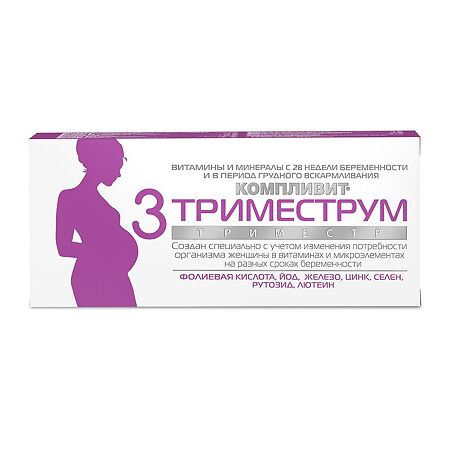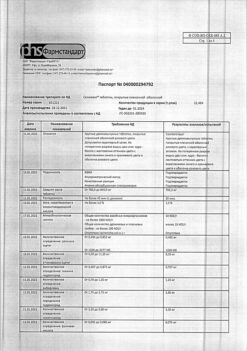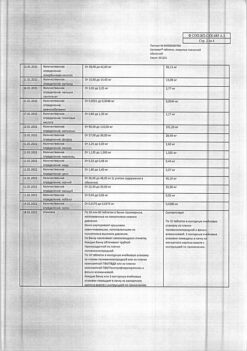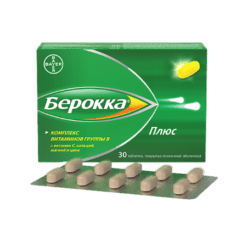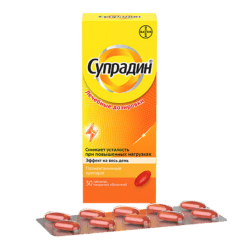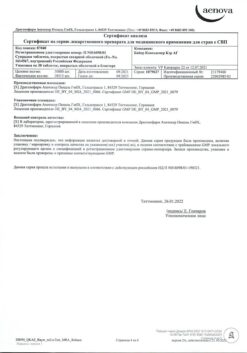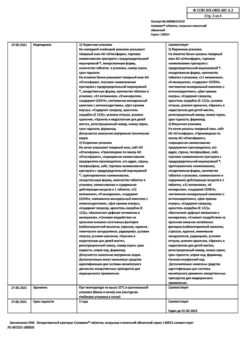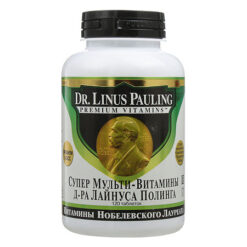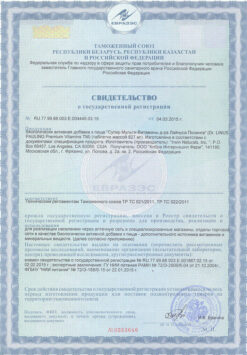No products in the cart.
Complivit Trimestrum 3, 30 pcs.
€1.00
Out of stock
(E-mail when Stock is available)
Description
A combined multivitamin preparation with micro- and macronutrients, the compatibility of the components in 1 tablet is provided by a special technology of production of vitamin and mineral complexes.
This vitamin-mineral complex has been developed specially to meet the varying needs of the woman’s body in vitamins and minerals at different periods of pregnancy. The action of the Complivit® Trimestrums 3 trimester is conditioned by the effects of its constituent components:
Vitamin A (retinol) is necessary for bone growth, normal reproductive function, for the regulation of division and differentiation of epithelium, as well as for the normal function of the retina. Retinol is involved in the formation of the visual organ and skeleton during fetal development.
B vitamins play an important role in metabolism and are necessary for the proper formation of organs and systems of the fetus and the development of the central nervous system.
Vitamin B1 (thiamine) plays an important role in protein, carbohydrate and fat metabolism, and processes of nerve excitation in the synapses. It participates in carbohydrate metabolism as well as in the synthesis of nucleic acids, proteins and lipids.
Vitamin B6 (pyridoxine) is involved in metabolism and is necessary for normal functioning of the central and peripheral nervous system. Helps to increase the absorption of magnesium in the intestine, which contributes to the prevention of its deficiency during pregnancy.
Nicotinamide (vitamin PP) – is involved in the metabolism of fats, proteins, purines, tissue respiration.
Vitamin B12 (cyanocobalamin) is involved in many metabolic processes, is necessary for the synthesis of DNA. Cyanocobalamin is involved in the formation of myelin, a component of the membrane of nerve fibers; with cyanocobalamin deficiency during pregnancy in the fetus may delay the formation of the nerve myelin sheath. Increases resistance of red blood cells to hemolysis. Increases the ability of tissues to regenerate.
Folic acid is involved in the synthesis of amino acids, DNA and RNA, and stimulates erythropoiesis. Folic acid reduces the risk of complications during pregnancy that develop against a background of folic acid deficiency: premature birth and premature detachment of the placenta.
Calcium pantothenate is a preparation of pantothenic acid, which plays an important role in metabolism: it participates in carbohydrate and fat metabolism, in the synthesis of acetylcholine and steroid hormones; it accelerates the regeneration process.
Vitamin C (ascorbic acid) is involved in the regulation of redox processes, carbohydrate metabolism, blood coagulation, tissue regeneration, increases the body’s resistance to infections. The need for vitamin C increases in the third trimester of pregnancy. Replacement of vitamin C deficiency contributes to the prevention of premature termination of pregnancy due to pathological conditions that develop against a background of ascorbic acid deficiency.
Vitamin D3 (colecalciferol) is involved in the regulation of calcium-phosphorus metabolism, increases the absorption of calcium in the intestine and reabsorption of phosphate in the kidneys. Promotes bone mineralization, the formation of the bone skeleton and teeth in children, and is necessary for normal functioning of the parathyroid glands. Deficit of colecalciferol can lead to rickets in children, osteomalacia and osteoporosis in pregnant women, and is quite common during breastfeeding.
Rutoside (rutin) – has angioprotective effect: it reduces the rate of filtration of water in the capillaries and their permeability to proteins. In the presence of venous insufficiency, lymphostasis reduces edema of the lower extremities.
Thioctic acid (lipoic acid) plays an important role in the energy balance of the body, is involved in regulating lipid and carbohydrate metabolism, has lipotropic and antioxidant effect, improves liver function, also improves nourishment of nerve cells.
Lutein is a carotenoid necessary for the normal functioning of the retina. It protects the eye from damage caused by exposure to ultraviolet light, is a component of the retinal antioxidant system and also provides protection to the retinal photoreceptors from oxygen radicals generated by adverse effects of radiation of different origin on the eye.
Manganese plays an important role in cell metabolism, is a member of the active center of many enzymes, is involved in protecting the body from the harmful effects of peroxide radicals. Imbalance of manganese in the fetoplacental system in pregnant women leads to disturbance of ossification processes in the fetal bone system, which leads to intrauterine growth retardation and delayed physical development of children in the first year of life.
Copper is essential for normal absorption of iron, the formation of connective tissue and blood cells. Supplementation of copper deficiency during pregnancy is necessary to prevent fetal growth retardation associated with copper deficiency.
Zinc is involved in metabolism and stabilization of cell membranes. It is a member of major enzymes and is involved in various biochemical reactions. Zinc stimulates the regeneration of the skin and hair growth, and has an immunomodulatory effect. Zinc is involved in cell division and differentiation, and is necessary for the prevention of fetal growth disorders developing against a background of zinc deficiency. Supplementary consumption of zinc contributes to improvement of perinatal outcomes.
Magnesium – reduces the excitability of nerve cells, is involved in many enzymatic reactions. Magnesium is involved in the formation of muscle and bone tissue, as well as in protein synthesis. It compensates for magnesium deficiency which occurs during pregnancy and increases the risk of premature termination of pregnancy, intrauterine growth retardation of the fetus, and the development of late gestosis.
Selenium is a trace element that is part of all body cells. It provides antioxidant protection of cell membranes, potentiates the action of vitamin E. Selenium is necessary for the immune system and for the maturation of the fetal lung surfactant system.
Iodine is essential for the synthesis of thyroid hormones and normal thyroid function, and is involved in lipid and protein metabolism. Reduces the risk of complications during pregnancy, developing against a background of iodine deficiency: gestosis and premature birth. It prevents congenital prenatal abnormalities of the brain, thyroid gland formation, the musculoskeletal system, and mental and physical retardation.
Form of release
Form of release
Film-coated tablets.
Additional information
| Shelf life | 2 years |
|---|---|
| Conditions of storage | In a dry, light-protected place at a temperature not exceeding 25 °C |
| Manufacturer | Pharmstandard-UfaVITA, Russia |
| Medication form | pills |
| Brand | Pharmstandard-UfaVITA |
Related products
Buy Complivit Trimestrum 3, 30 pcs. with delivery to USA, UK, Europe and over 120 other countries.

